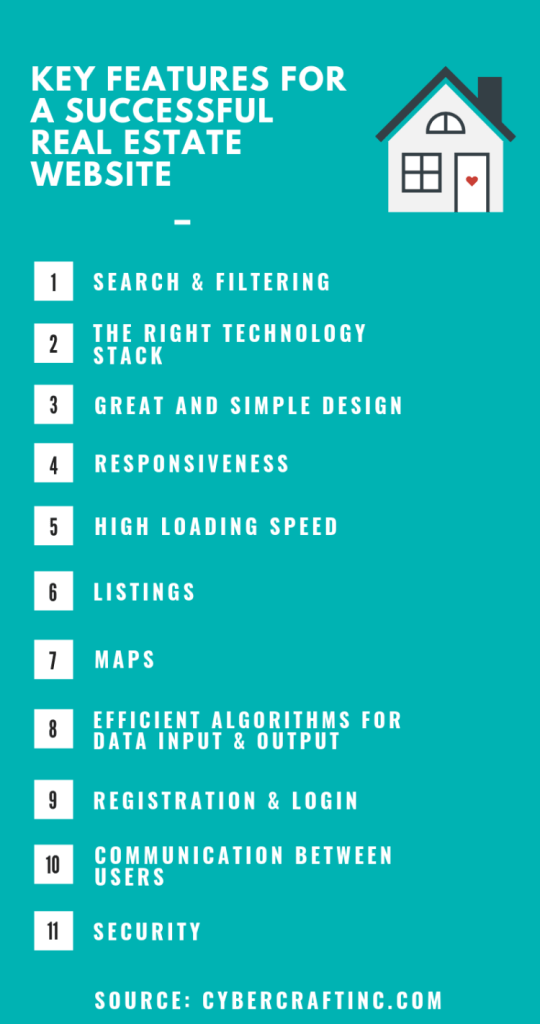Real Estate Website Development
Want to build your own real estate website? Looking for a detailed guide to successful real estate website design? Look no further, as in this guide we will provide the best real estate website design and development tips for building a world-class website for your business.
The real estate industry is one of the most crowded and attractive niches in the business world. This is especially true in the United States and Canada where the market is very dynamic.
Did you know that 223 billionaires from the Forbes list made most of their wealth in real estate, according to Forbes Magazine? Furthermore, by 2025, the global real estate market is expected to grow to over 4 trillion dollars, according to Grand View Research.
Taking this data into account, it’s not surprising that tens of millions of people are involved in the industry. Just like any other business niche, it’s constantly changing and progressing. Almost no industry can stay aside from technological trends and progress.
The real estate industry is no exception to this rule – it is subject to technological advancements. And that’s why website development for real estate should be aligned with modern tendencies in the industry: a property portal must be connected to listings and mappings, have clear navigation, user friendly design, advanced search, and other features.
Why You Must Create Real Estate Website
The most noteworthy trend which affected is the rise of the Internet and smartphones. Real estate market moved online – now more and more deals are taking place online. Buyers and sellers find one another online on websites like Zillow or Trulia.
Choosing to stay aside from this trend means cutting yourself from a big share of the market. Therefore, if you are involved in the real estate market, having a great website is a must if you want to be successful. Note, if you wish to learn how to build a real estate app, check out our other guide:
How to Build a Website like Zillow, Trulia + App: Time & Cost
That’s exactly what we will talk about below. We will explain in detail what key features a great real estate website must have and how to implement them. We will also explain how to find the best possible development team to build your website.

Key Features of Successful Real Estate Website Design
How complex your website has to be depends on the goals you’ve set for it. If you intend to build a giant aggregator then, of course, it’s going to be more complicated than a simple website for a small local realty. Nevertheless, we are going to list the key features which you need to consider when going through real estate web development:
- Search & filtering
- The right technology stack
- Great and simple design
- Responsiveness
- High loading speed
- Listings
- Maps
- Efficient algorithms for data input & output
- Registration and login
- Communication between users
- Security

Of course, every website is different but the features above are common for most real estate websites. Let’s analyze each of these in detail.
Search & Filtering
Obviously, users must be able to search for and find properties. Besides, they must be able to filter search results by certain criteria. The mandatory criteria you should include are the price, location, number of bedrooms, bathroom, total area, etc. Doing this will require developing efficient search & filtering algorithms which will provide relevant and accurate results as fast as possible.
The Right Technology Stack
One of the first questions which come to mind is the technology stack i.e. the programming languages, frameworks, technologies, etc. which you will utilize for development. Careful and diligent planning of the stack is crucial for a smooth development process. First, you need to select the right listing syndication platform. The most popular ones include ListHub, Point2, 365 Connect, RealBird, JbGoodwin Realtors. As for languages, PHP, CSS, HTML, Javascript, and its frameworks are the most common options. Alternatively, Ruby on Rails may also work. As for the database, Amazon and MySQL are classical options.
Great and Simple Design
You don’t want your website to look like it was developed in 1995. A modern and simple design is what you want instead. Simple means that user attention is focused on one or two things at a time, not on a million different things. Ever been to one of those websites where there are a million different columns and boxes, and you can’t understand what’s going on? Exactly, you definitely want to avoid that. Instead, you should aim for minimalistic and usable design which makes the website easy-to-use and pleasant to the eye at the same time.
Responsive Design
Did you know that most website visits take place on mobile devices, according to Statista? In other words, if your website is not responsive you may lose a significant portion of traffic, leads, and ultimately sales. Therefore, you must do whatever it takes to ensure that your website can boast responsive design.
High Loading Speed
If your website takes too long to load, you may lose a significant share of traffic and potential sales. Google reports that 53% of website users abandon a website if it loads for more than three seconds. Similarly to the importance of responsive design, slow loading speed can kill your traffic, leads, and sales. Therefore, it is vital that you conduct extensive speed optimization to ensure that your website enjoys the highest loading speed possible.
Listings
Now we come to the most important part – listings. As we’ve said previously, listings must come from somewhere. Unless you’re going to be using your own database you will have to utilize listing syndicators. It is necessary to design a listing profile template and all the other related pages. The key elements this template should have are pictures, videos, location, description, various fields such as price, area, etc. Listing data also has to be integrated with your search & filtering algorithms.
Maps
Real estate and maps are two inseparable things. Giving users the ability to use a map for finding properties will enhance user experience and make the search process easier. The most popular real estate websites and apps use maps as well. The most popular map APIs are Mapbox, Google Maps, Zillow Neighborhood Boundaries, Area API, Walk Score, School Digger, Yelp Fusion. The API data has to be integrated with the rest of the functions of the website.
Efficient Algorithms for Data Input & Output
Regardless of whether you are going to be using your own listing database or connect to a syndicated one, you need smart algorithms for quickly and efficiently processing all those large amounts of data, both the input and output.
Registration and Login
In many cases, you want to enable your users to register. Therefore you want to develop a quick & easy registration process. Add as few fields as possible. It’s also preferable that you allow signing up and registration via third-party apps such as Google+, Facebook, LinkedIn, and others. With registration, you may also need to create member profile templates.
Communication Between Users
If you’re going to allow registration, you may also want to enable users to message one another. This will require developing a messaging platform inside your website. If you need a ready-to-use solution, SendBird or TalkJS might be good options.
Security
Finally, your users want to be sure that their data is completely secure. It is worth investing sufficient funds and time to develop a reliable security system for your website. A successful hacker attack with the leaking of users’ personal data may damage your reputation forever.
Now that we have discussed the main features of a perfect real estate website, let’s talk about the exact steps you must take to build one.
How to Find the Best Real Estate Websites Developer?
How to Find the Best Real Estate Websites Developer?

Finding a real estate website developer shouldn’t be difficult. After all, there are so many companies out there, right? Nevertheless, many clients find it difficult to find a decent contractor. The possible reason is that they don’t know the right real estate web development tips. That’s exactly what we will provide below:
- Consider offshore developers
- Check their experience
- Choose the best price/quality ratio
The first question which arises in the search process is where to find the right real estate website development company. Should you consider only local real estate website developers or remote ones? Let’s see…
Consider Offshore Developers
For some people, working with remote real estate web design companies seems risky compared to local developers. While it may be true in some rare cases, for most people the offshore option is much better. Usually, it provides significant cost savings and a better price/quality ratio. You can find developers who are just as talented and qualified as local ones.
Talking about specific locations, we must note that with remote development the location is not really that important. Nevertheless, we would recommend Eastern Europe and Ukraine, in particular. Developers there can boast great skills, qualifications and free command of English while requiring lower salaries than in the US or UK.
Check Their Experience
When we talk about the experience we mean relevant experience. The only experience you’re looking for is sufficient experience with the required tech stack. It’s even better if real estate website development company has successfully completed projects similar to yours.
Choose the Best Price/Quality Ratio
When making a decision which development company is better, you should take both the quality and price into account. However, it’s never a good idea to sacrifice quality for price.
Conclusion
We hope you found our guide useful. The impact of technologies on the real estate industry is undeniable. No real estate business can succeed these days without a website. Today we have described in detail what features a perfect real estate website must possess.
We also explained the basic steps for building a real estate website and finding a real estate web developer. If you approach this process seriously and diligently enough you will end up with a beautiful and functional website which will bring your business more clients and revenue. Should you want know more about property management software development, please check out another guide in our blog.




